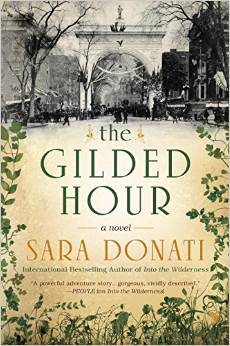The Gilded Hour
by Sara Donati (Rosina Lippi)

Synopsis:
The year is 1883, and in New York City, it’s a time of dizzying splendor, crushing poverty, and tremendous change. With the gravity-defying Brooklyn Bridge nearly complete and New York in the grips of anti-vice crusader Anthony Comstock, Anna Savard and her cousin Sophie—both graduates of the Woman’s Medical School—treat the city’s most vulnerable, even if doing so may put everything they’ve strived for in jeopardy.
Anna's work has placed her in the path of four children who have lost everything, just as she herself once had. Faced with their helplessness, Anna must make an unexpected choice between holding on to the pain of her past and letting love into her life.
For Sophie, an obstetrician and the orphaned daughter of free people of color, helping a desperate young mother forces her to grapple with the oath she took as a doctor—and thrusts her and Anna into the orbit of Anthony Comstock, a dangerous man who considers himself the enemy of everything indecent and of anyone who dares to defy him.
My Review:
What an amazing story about the importance of education/information and the dangers of the notion of controlling the masses through the use of fear, unrealistic moral expectations and control. The important discussion in this book is around women's health at the end of the 1800s. However, you can see the relevance to any time beyond then. I think of the similar impacts made in women's health by events such as the women's vote, the inception of Planned Parenthood, the women's rights movement, the Supreme Court ruling of Roe vs. Wade, etc. This story is about two cousins - Anna and Sophie Savard. Both are physicians who treat women in NYC. One, Sophie, is from New Orleans. She is of mixed race but has lived so long in NYC with her white aunt that she assimilates best among whites. However, she is curious about her black heritage and has the opportunity to meet with blacks in Brooklyn where she feels the cultural pull. By the simple fact that she is a woman and of mixed race, her life is marked. But her resolve to be the best most ethical physician drives her actions. She cares about women's rights about their bodies and supports fully her cousin's efforts to spread the much needed education about women's health and the importance of using and having access to contraception. What makes things difficult in their efforts is the very powerful Anthony Comstock, postmaster general of the time. He is the author of the Comstock Act of 1873 that enforced the suppression of trade in, and circulation of, obscene literature and articles of immoral use by criminalizing the use of the U.S. Postal Service to send any literature related to such things considered immoral like contraception information, sexually explicit literature, erotica, etc. As a feminist and as a woman, it was so frustrating (as it is in current time) to confront the ignorance and control that men like Comstock enforce. S. Donati does a great job presenting the situation in a way that you can see just how damaging this mentality is to women and the advancement of women's health research. There is a secondary, somewhat related story about 4 orphans who are separated and search each other to reunite in a time when orphans had very few opportunities to overcome their circumstances because of the overwhelming numbers. The connection between the stories has to do with the lack of information about women's health and contraception leading to so many unwanted children that they were turned out and given to the orphanage world run primarily by the Catholic church. Anna Savard assumes the care of the two Italian girl orphans searching for their two missing brothers. In the process, an Italian detective-sergeant with the New York police department, Jack Mezzanotte, not only falls for Anna romantically but helps her in the search for the girls' two brothers. His immigrant-Italian background help her understand the cultural differences between her NYC upper-class family and that of the girls. This is such a complete experience in so many ways. The plot is perfect and relevant. It manages to educate the reader about an important time in history as well as the cultural differences that make us that "melting pot" we tend to forget about. Plus the important discussion about women's health and the importance of women's rights in the care and decisions to be made about their bodies without being "preachy" or one-sided. It simply presents the facts and assumes the reader is smart enough to come to their own conclusion.
Fantastic read. Never dull or too bogged down in historical facts but rather written into the story as part of the story. Plus, what I loved most and in my opinion makes this such an important read is the depiction of such strong, intelligent, capable women who are real, relevant and even flawed.

No comments:
Post a Comment